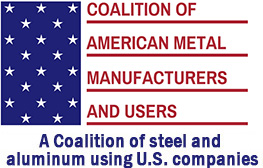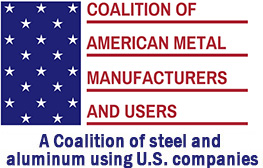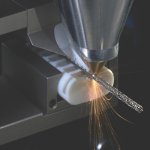Coalition asks Commerce Secretary to terminate job-costing tariffs
Coalition asks Commerce Secretary to terminate job-costing tariffs
Continued job losses and lost business can be expected if the Section 232 tariffs on steel and aluminum are allowed to continue, according to a manufacturing coalition.

 Continued job losses and lost business can be expected if the Section 232 tariffs on steel and aluminum are allowed to continue, according to a manufacturing coalition.
Continued job losses and lost business can be expected if the Section 232 tariffs on steel and aluminum are allowed to continue, according to a manufacturing coalition.
In a letter to the new U.S. Secretary of Commerce, Gina Raimondo, the Coalition of American Metal Manufacturers and Users (CAMMU) disputed Raimondo's assertion that these tariffs "have been effective," a claim Raimondo made during a March 4 interview on MSNBC.
"As we wrote to President Biden on February 10, 2021, there is, in fact, scant evidence that the Trump steel and aluminum tariffs have helped the domestic steel industry, as the sector continues to close plants and shed jobs," wrote Paul Nathanson, executive director of CAMMU. "But numerous published studies provide evidence of the damage caused by these tariffs to our nation's economy, its small manufacturing businesses, employment in the manufacturing sector, and to carefully constructed supply chains."
 According to the CAMMU, the Trump steel and aluminum tariffs sought to protect a small subsection of those domestic industries at the expense of the nation's economy as a whole. "Over 6.2 million Americans work in industries that use steel, while the steel industry itself directly employs only 141,700 workers. The tariffs have shifted injury from one industry to a much broader segment of the economy."
According to the CAMMU, the Trump steel and aluminum tariffs sought to protect a small subsection of those domestic industries at the expense of the nation's economy as a whole. "Over 6.2 million Americans work in industries that use steel, while the steel industry itself directly employs only 141,700 workers. The tariffs have shifted injury from one industry to a much broader segment of the economy."
Bureau of Labor Statistics' data on employment in steel and aluminum production shows that approximately 1,000 more jobs were created in November 2019 than in March 2018 in the protected industries.
By contrast, a study by the Federal Reserve Board of Governors indicates that increased input costs due to the tariffs are associated with 75,000 fewer jobs in the U.S. manufacturing sector.
In addition to job loss, the CAMMU letter points to other data that illustrate what the group considers to be negative consequences of the tariffs, including scarcity of raw materials, the burden of tariffs having to be borne by U.S. manufacturers and consumers, and retaliatory tariffs imposed by U.S. trade partners.
"The Trump tariffs have increased the costs of goods manufactured in America when compared to overseas competitors whose governments do not impose an artificial tax on their inputs," wrote Nathanson. "If these tariffs are not terminated, the result will be lost business for U.S. manufacturers and lost U.S. jobs."





